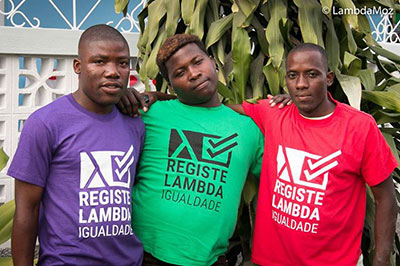Homosexuality to be legal in Mozambique, but problems remain

Lambda supporters wear t-shirts calling for the registration of their organisation (Pic: Lambda)
The LGBT community in Mozambique is celebrating the legalisation of homosexuality later this month, but challenges remain.
On 29 June, the country’s new penal code, signed into law in December last year, will come into effect.
The revision has seen the removal of articles found in the previous penal code that refer to “security measures” against people “who habitually engage in vices against nature.”
Mozambican LGBT rights organisation Lambda welcomed the move on Monday as “a victory.” The group’s Danilo Da Silva told Mambaonline that “we consider it a win,” but explained that the organisation is not fully satisfied with the new penal code.
He revealed that since 2009 Lambda has lobbied not only for the removal of the articles criminalising homosexuality but also for the new penal code to bar discrimination on the basis of sexual orientation.
“One of the articles in the penal code makes it a crime to discriminate on the basis of race, gender and ethnicity, but doesn’t include sexual orientation,” he said, adding that, “we will not rest until we have the inclusion of sexual orientation.”
Da Silva further confirmed that the Mozambican government is still refusing to register his organisation as an NGO. A process that usually takes 40 days has dragged on for almost eight years, with the Ministry of Justice ignoring Lambda’s applications for registration.
In 2010, the group took its case to the United Nations, appealing to the High Commission for Human Rights for support.
During the UN Universal Periodic Review of Mozambique four years ago, the UN called for “the registration of NGOs working on issues of sexual orientation and gender identity…” and urged that the “authorities speed up the process of legalisation of Lambda.”
The recommendations have been ignored. “We are still not registered in spite of all the efforts. We have a new Minister of Justice and we have requested to meet him but he hasn’t replied,” Da Silva said.
“They can’t refuse registration. They are just not following the law. It’s a fundamental right. We are not asking for anything new.”
He expects the matter to be discussed again at the UN in 2016, when the country comes up for the next review of its human rights.
“The new penal code is a victory,” said Da Silva, “but it tastes sour. The government must guarantee the rights of every citizen. We are disappointed that it’s not happening.”
- Facebook Messenger
- Total119
Leave a Reply